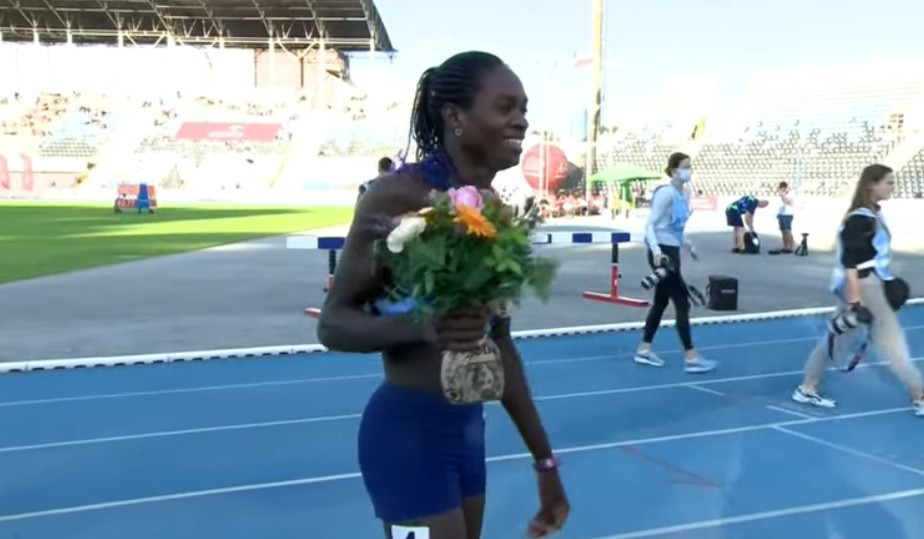Namibia National Olympic Committee (NNOC) President Abner Xoagub has described World Athletics' handling of the Beatrice Masilingi and Christine Mboma case as an "unacceptable invasion" of the two teenagers' privacy.
Speaking to The Namibian, Xoagub accused World Athletics of breaking a confidentiality agreement with the NNOC after the global governing body removed the 18-year-old pair from the list of qualifiers for the Olympic 400 metres after were both found to have high natural levels of testosterone.
Last week’s ruling means Masilingi and Mboma will be unable to compete in the women’s 400m at this month’s delayed Olympics in Tokyo.
The news came just days after Mboma registered the fastest time of the year over the distance and the seventh-quickest of all time.
Xoagub has suggested the NNOC will look to join forces with other National Olympic Committees who have felt "marginalised" by World Athletics in a bid to challenge the ban after the Games.
"This is an unacceptable invasion of the athletes' right to privacy and to the confidentiality of their health records," said Xoagub.
"Throughout our communication, we agreed that we will treat this with the respect and confidentiality it deserves because of its sensitivity, but World Athletics did not take that into consideration."
Mboma broke the under-20 world record and posted the quickest time of the year in the women's 400m when she ran 48.54sec at the Irena Szewińska Memorial meeting in Bydgoszcz in Poland.
With world champion Salwa Eid Naser of Bahrain serving a two-year doping ban and out of the Olympics, Mboma had looked one of the favourites to challenge for the gold medal.
Masilingi was also expected to be in the mix for a medal having registered a season’s best of 49.53 - a time only Mboma and Bahamian Olympic champion Shaunae Miller-Uibo have bettered this year.
Mboma and Masilingi were made to undergo an assessment by World Athletics, the results of which indicate that the pair have differences in sexual development (DSD) and high natural levels of testosterone.
Under the global governing body's rules, such athletes must take drugs to reduce their naturally-occurring testosterone if they want to compete in women's events ranging from 400m to a mile.
According to The Namibian, Mboma and Masilingi underwent a test last year to find out whether they were biologically female before undergoing a further examination to determine their testosterone levels.
"These ladies have XX chromosomes, they are females and conform to all female biological requirements," Xoagub said.
"We received the results of that [second] test on 30 June 2021.
"We shared the results with World Athletics' medical and science head.
"They promised they would conduct their own tests to verify and subsequently come back to us.
"But to our disappointment, we only learned on Thursday in the morning hours that World Athletics removed the names of these two athletes from the Tokyo Olympic Games' list as far as the 400m is concerned.
"We did not receive any further communication to this effect, and I should say at this point we are grossly disappointed with the way World Athletics has dealt with this issue."
World Athletics insists that the rules on testosterone levels exist to protect women's sport, but others have criticised them for infringing on human rights.
Caster Semenya - Olympic 800m champion at London 2012 and Rio 2016 - is the most high-profile athlete to be impacted by the legislation, and is challenging it at the European Court of Human Rights.
The South African and the two other medallist in the women's 800m at Rio 2016, Burundi's Francine Niyonsaba and Margaret Wambui of Kenya, have all since been told they cannot race over distances between 400m and the mile.
Although Masilingi and Mboma will be unable to compete in their favoured 400m event, the duo have qualified for the 200m and been picked by their country.
They both ran 22.67 200m races last month - under the 22.80 entry standard for the Games.
But Xoagub has hinted that the NNOC will consider challenging the 400m ban once the Olympics have concluded.
"Namibia will look to ally with nations whose athletes have been marginalised by WA on similar grounds to contest the ban," said Xoagub.
"For us to challenge this will be a costly and lengthy process, and we won't be able to address that issue now before the Tokyo Olympics."
Athletics Namibia added: "For now, we want the girls to focus on the 200m preparations for the Olympics.
"We will have to sit with the athletes and decide on the way forward.
"We will look at what decision will best suit both parties.
"The focus now is on the Olympics, and we will attend to all of this after the Olympics."
insidethegames has contacted World Athletics for comment.

